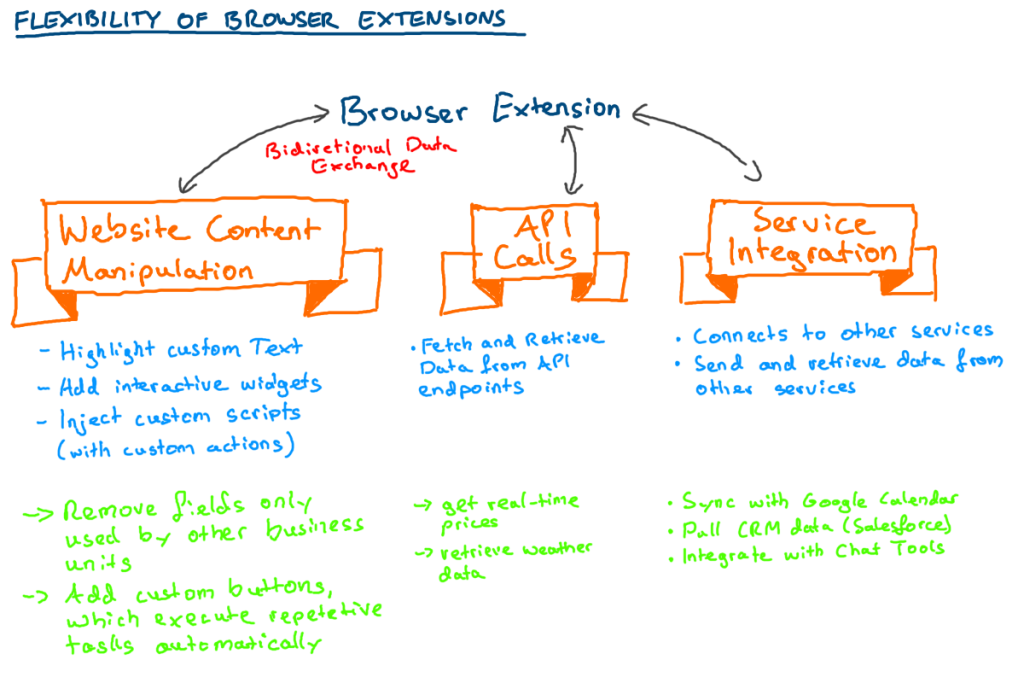The Rising Importance of Browser Extensions for Businesses
In today’s increasingly digital world, businesses are adapting to a software landscape that is shifting rapidly to the cloud. This evolution has not only streamlined workflows but also transformed the way organizations approach customization and functionality. Among the key tools enabling this transformation are Browser Extensions — small but powerful add-ons that integrate directly into the Browser. These extensions have become essential for companies aiming to remain agile, efficient, and competitive.
Why Browser Extensions Matter
As companies migrate to the cloud, the traditional need for extensive software installations and updates has been replaced by browser-based applications. Extensions provide a bridge between standard web applications and bespoke organizational needs, offering an unprecedented level of flexibility.
Enhanced Functionality: Extensions allow companies to extend the capabilities of existing web applications. For example, an extension can integrate additional tools into Gmail or Google Drive, enabling custom workflows without the need to update existing software. They can also make API calls to get data from other endpoints.
Cost Efficiency: Developing custom software from scratch can be time-consuming and costly. Extensions offer a way to implement tailored solutions at a fraction of the cost, as they leverage existing platforms while addressing specific organizational needs.
Improved Productivity: Extensions like project management tools, CRM integrations, and advanced analytics dashboards help streamline workflows directly within the browser. This eliminates the need to switch between multiple applications, saving time and reducing errors.
Seamless Updates: Unlike standalone software, extensions benefit from automatic updates. Businesses can enjoy continuous improvements and bug fixes without downtime, ensuring uninterrupted operations.

Flexibility Without Web App Overhauls
One of the most significant advantages of Extensions is their ability to add or modify functionalities without requiring major updates to the core web applications. For instance:
Custom Data Handling: Organizations can create extensions that adapt how data is processed, displayed, or transferred within their existing web apps. And this especially relevant when data is spread accross multiple web apps.
Localized Solutions: For multinational companies, extensions can offer localized features, such as language-specific tools or region-specific compliance functionalities.
User-Specific Adjustments: Extensions allow for tailored experiences, enabling individual teams or departments to customize their workflows without affecting the broader organization’s system.
The Future of Browser Extensions in Business
As the reliance on cloud-based tools continues to grow, so too will the demand for robust, innovative extensions. Companies can expect to see even more sophisticated extensions leveraging AI, machine learning, and advanced analytics to deliver smarter, more intuitive solutions. Furthermore, the growing developer ecosystem for extensions ensures a steady flow of new tools tailored to diverse industries and needs.
Disadvantages of Using Extensions
While Extensions offer many advantages, they are not without their downsides.
One of the primary concerns is security (in case you use 3rd Party extensions). Extensions often require access to sensitive data, and if not properly vetted, they can pose significant risks such as data breaches or malware infections. Additionally, over-reliance on extensions can lead to compatibility issues when updates to the web-applications are released. Performance may also suffer if too many extensions are installed, as they can consume system resources and slow down the browser.
Another disadvantage is that extensions are typically developed for specific browsers. In corporate environments, this is usually manageable, as companies often standardize on a single browser across their organization, but it can become a challenge if multiple browsers are in use.
Finally, managing and maintaining extensions across a large organization can be challenging, requiring robust policies to ensure compliance and functionality.
Conclusion
In a world where agility and customization are paramount, Browser Extensions provide businesses with a critical advantage. They empower organizations to adapt quickly to changing needs, enhance productivity, and optimize workflows – all while maintaining cost efficiency.
As cloud adoption accelerates, the role of extensions in the corporate toolkit will only become more indispensable.
Forward-thinking companies would be wise to explore and invest in this area of innovation.
But wait, does my Company Browser Support Extensions?!
Most likely, yes! I listed the most common company browsers below including a link to their extension documentation.
Chrome extensions enhance the browsing experience by customizing the user interface, observing browser events, and modifying the web.
A little bit more complex, but still viable are Safari Browser Extensions.
Learn about the anatomy of an extension and get an overview of the extension development and publication workflow, Firefox style.
Develop an extension (add-on) for Microsoft Edge.
Also Opera has its own type of Brwoser extensions. Find the documentation below.



